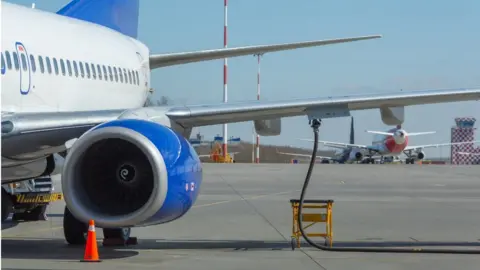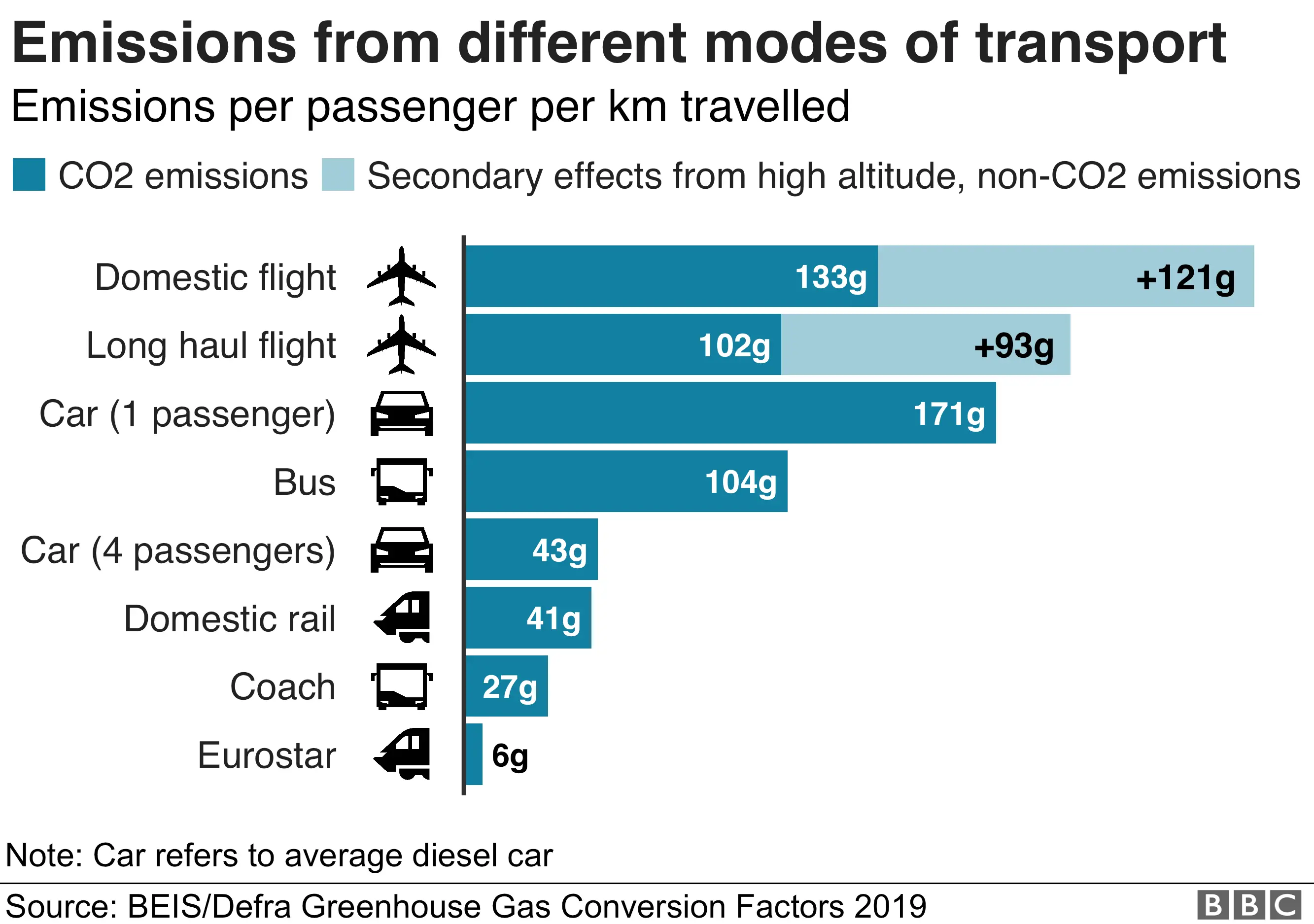Green flights not in easy reach, warn scientists
 Getty Images
Getty ImagesYou may be hoping that guilt-free flying is just around the corner, but scientists warn it is still a long way off.
Plans for climate-friendly flying rest on creating greener jet fuels that have less impact on the environment.
Switching to sustainable fuel is also key to the government's aim to reach "jet zero" flying by 2050.
But the Royal Society concludes there is currently no single, clear alternative to traditional fuel.
The trade body for UK airlines said the sector was committed to the 2050 target and that sustainable fuels would be a key factor in reaching it.
Flying is responsible for 2.4% of global greenhouse gas emissions and 8% of UK emissions. These gases warm the atmosphere, contributing to global warming and climate change.
Demand for flights is expected to increase, and governments and the aviation industry are experimenting with ways to reduce the climate impacts of traditional kerosene fuel.
The authors of the Royal Society report looked at four options for greener fuels to replace the 12.3m tonnes of jet fuel used annually in the UK.
It concluded that none could replace fossil jet fuel in the short term.
Some airlines now use very small amounts of biofuel, largely made from crops. London Heathrow is the largest global user of biofuels but it accounts for just 0.5% of the airport's fuel.
To produce enough to supply the UK aviation industry would require half of Britain's farming land, putting pressure on food supplies, the Royal Society says.
Another option is fuel made from hydrogen produced with green electricity. However the UK currently does not generate enough renewable electricity to make enough green hydrogen.

Another major barrier is that existing plane engines cannot use hydrogen-based fuel.
Ammonia and synthetic fuels are also under consideration, but they need even more green hydrogen and it is unclear if existing planes could use them.
The authors say it remains unclear exactly how much each alternative fuel would reduce the climate impacts of flying.
But they stress that in the long term a successful alternative fuel will probably be developed, but that airplanes and airports will need to be re-designed.
They are calling for more research into sustainable aviation fuel, suggesting that the UK could become a global leader if it invested in solving the problem.
A new fuel needs to be financially viable, safe, usable around the world, and to have high enough energy density to be used on long-distance flights, they say.
The trade body for UK airlines, Airlines UK, said in response that sustainable fuels were safe and increasingly commonplace, and that the sector was committed to the 2050 'jet zero' target.
"There is no magic bullet, but by modernising airspace to make flying more efficient, by introducing new zero emission technology like hydrogen aircraft and by upscaling the use of sustainable aviation fuels this decade, it can be achieved," it said in a statement.
Regarding the Royal Society's assertion that sufficiently supplying the UK aviation industry with sustainable fuels would put pressure on food supplies, Airlines UK said the UK had sufficient feedstocks, that they would be drawn initially from household, commercial, agricultural and forestry waste and waste industrial gases, and that they did not compete with food crops.
"Decarbonising aviation is undoubtedly a challenge, and the sector is working closely with government on ways to accelerate the transition and maximise both the environmental and huge economic opportunities from leading the 'jet zero' transition,"Airlines UK said.
Environmental campaigners say the government must also encourage people to fly less.
"Not all aspects of modern life in Western nations have an easy 'technofix' for the damage they do to the environment, and nowhere is this truer than for air travel," suggests Leo Murray, director of innovation at climate charity Possible.
His organisation wants the government to tax frequent flyers, the small number of people who take around 70% of flights from UK airports.
"A Frequent Flyer Levy would target reduced demand amongst the group responsible for most of the environmental damage today, while leaving the annual family holiday untouched," he says.
A Department for Transport spokesperson said: "The UK's Sustainable Aviation Fuels programme is one of the most comprehensive in the world. Sustainable Aviation Fuels and Hydrogen are key elements of this, and we will ensure that there is no impact on food crops."
(16:20 GMT - This story has been updated to add a response from the UK airline industry trade body)
